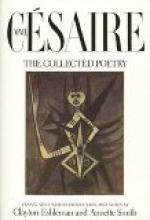|
This section contains 789 words (approx. 3 pages at 300 words per page) |

|
As soon as one begins to read Césaire, it becomes obvious that for him, unlike prose, poetry begins with extreme positions and espouses easily the most unexpected exaggerations. Giving himself entirely to the ancestral appeal of mother Africa, the poet often views négritude as virtue and whiteness as evil. His lyrical confrontation between white technology and black innocence has a quality of spontaneity about it, at once conquering and destructive. Moreover, his verbal incandescence appears to evoke a surrealistic language…. (p. 107)
[Aimé Césaire's] switch to the theatre did not really constitute an unusual metamorphosis. In writing for the stage he conserved intact the vigor of his poetry, his predilection for lyrical outbursts, and the use of Claudelian verset. Yet, in an unusual combination at which probably the Catholic poet would shiver, Claudel joins Brecht in Césaire's theatre…. [He] combines successfully a majestic and violent...
|
This section contains 789 words (approx. 3 pages at 300 words per page) |

|


